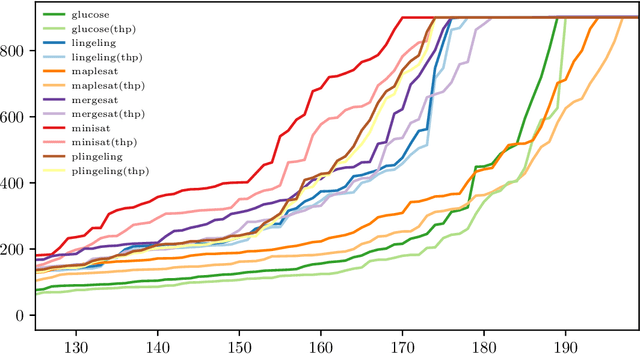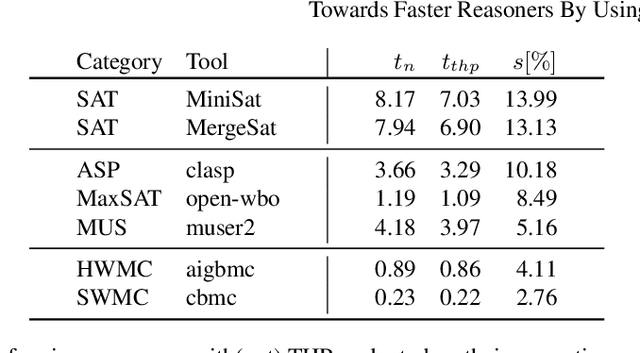André Schidler
Efficient and Reliable Hitting-Set Computations for the Implicit Hitting Set Approach
Aug 09, 2025Abstract:The implicit hitting set (IHS) approach offers a general framework for solving computationally hard combinatorial optimization problems declaratively. IHS iterates between a decision oracle used for extracting sources of inconsistency and an optimizer for computing so-called hitting sets (HSs) over the accumulated sources of inconsistency. While the decision oracle is language-specific, the optimizers is usually instantiated through integer programming. We explore alternative algorithmic techniques for hitting set optimization based on different ways of employing pseudo-Boolean (PB) reasoning as well as stochastic local search. We extensively evaluate the practical feasibility of the alternatives in particular in the context of pseudo-Boolean (0-1 IP) optimization as one of the most recent instantiations of IHS. Highlighting a trade-off between efficiency and reliability, while a commercial IP solver turns out to remain the most effective way to instantiate HS computations, it can cause correctness issues due to numerical instability; in fact, we show that exact HS computations instantiated via PB reasoning can be made competitive with a numerically exact IP solver. Furthermore, the use of PB reasoning as a basis for HS computations allows for obtaining certificates for the correctness of IHS computations, generally applicable to any IHS instantiation in which reasoning in the declarative language at hand can be captured in the PB-based proof format we employ.
Towards Faster Reasoners By Using Transparent Huge Pages
Apr 29, 2020



Abstract:Various state-of-the-art automated reasoning (AR) tools are widely used as backend tools in research of knowledge representation and reasoning as well as in industrial applications. In testing and verification, those tools often run continuously or nightly. In this work, we present an approach to reduce the runtime of AR tools by 10% on average and up to 20% for long running tasks. Our improvement addresses the high memory usage that comes with the data structures used in AR tools, which are based on conflict driven no-good learning. We establish a general way to enable faster memory access by using the memory cache line of modern hardware more effectively. Therefore, we extend the standard C library (glibc) by dynamically allowing to use a memory management feature called huge pages. Huge pages allow to reduce the overhead that is required to translate memory addresses between the virtual memory of the operating system and the physical memory of the hardware. In that way, we can reduce runtime, costs, and energy consumption of AR tools and applications with similar memory access patterns simply by linking the tool against this new glibc library when compiling it. In every day industrial applications this easily allows to be more eco-friendly in computation. To back up the claimed speed-up, we present experimental results for tools that are commonly used in the AR community, including the domains ASP, BMC, MaxSAT, SAT, and SMT.
 Add to Chrome
Add to Chrome Add to Firefox
Add to Firefox Add to Edge
Add to Edge